Committed to Protecting the
Rights of Injured Workers
A Chicago forklift accident lawyer from our team can ensure that you receive fair compensation for medical bills, lost wages, and other needs after workplace injuries. Whether you’re pursuing a workers’ compensation claim or a personal injury lawsuit, our top-rated Chicago attorneys are here to help. Contact ustoday for a free consultation about your legal rights.
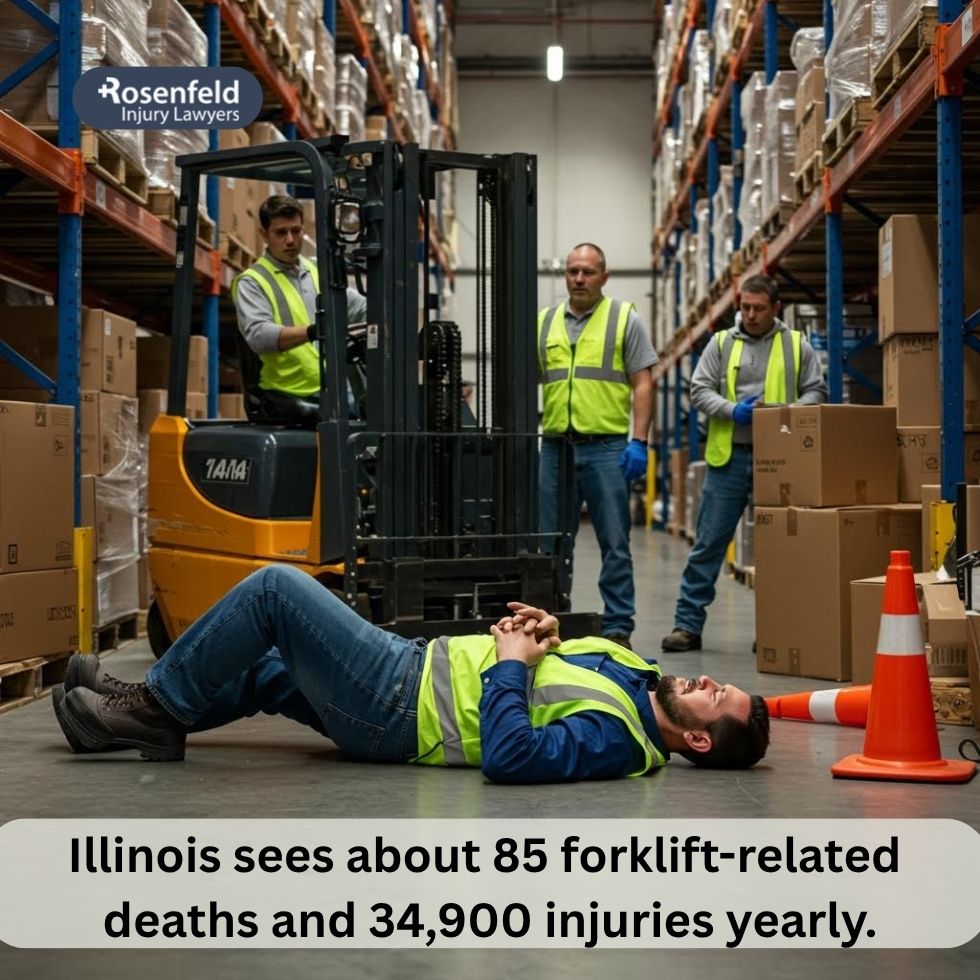
Our Chicago forklift accident attorneys are nationally recognized for peerless trial representation and a 98% success rate in recovering compensation. With over 5,000 successful personal injury claims resulting in over $490 million in verdicts, we are committed to ensuring forklift accident victims receive maximum compensation for their injury claim.
Workers’ compensation benefits are a type of insurance provided by companies for injured workers. This is a no-fault system, meaning that it doesn’t matter whether you were responsible for the accident.
Those who suffered forklift injuries at someone else’s worksite can seek a third-party lawsuit against forklift operators, general contractors, construction site operators, and companies.
If defective equipment or inadequate safety warnings caused a forklift accident, you can hold the forklift manufacturer accountable through a personal injury claim.
Fatal forklift accidents leave grieving families with high medical expenses and emotional trauma. Our forklift accident attorneys will pursue compensation from operators, companies, and manufacturers on your behalf.
Inadequate training, inattention, or reckless driving often leads to tip-overs, collisions, and crushing incidents.
Malfunctioning brakes, steering issues, and hydraulic failures from neglected maintenance are a frequent cause of accidents.
Cluttered aisles, blind spots, and narrow passageways increase the risk of forklifts striking workers or objects.
Driving too fast for the environment—especially in tight warehouse areas—reduces reaction time and increases the risk of rollovers.
Unsecured or uneven loads can shift or fall, leading to tipping accidents or materials falling onto workers.
Work zones without marked walkways, mirrors, or warning signals often result in workers being hit by forklifts.
Dim lighting, blocked sightlines, or lack of backup alarms make it difficult for operators to detect nearby hazards.
Operating on cracked floors, steep ramps, or loose gravel can cause forklifts to lose stability or traction.
Employers who skip training requirements, ignore equipment inspections, or fail to enforce safety policies increase the likelihood of serious injuries.
The Occupational Safety and Health Administration provides clear standards for the proper training, maintenance, and operation of forklifts. The National Institute for Occupational Safety and Health (NIOSH) explains them as follows:
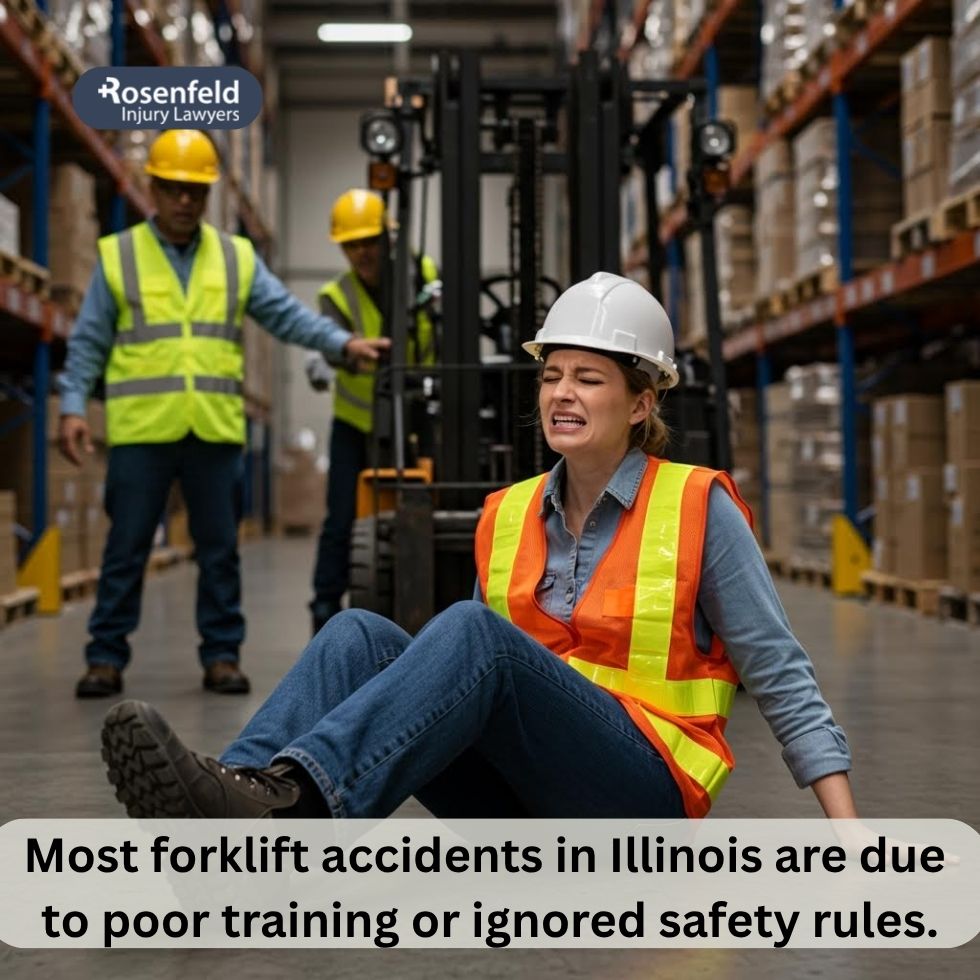
Forklift accidents can result in serious injuries or even death. Common forklift injuries include:
Our forklift accident lawyers will negotiate for full compensation based on your injuries. If you are seeking workers’ compensation benefits, your compensation will include medical bills and lost wages, while a personal injury lawsuit may provide non-economic damages like emotional distress.
A forklift accident workers’ comp claim can include:
A forklift accident personal injury lawsuit can offer additional compensation, such as:
The average forklift accident settlement in Chicago is $2,806,232, with a median settlement of $2,000,000. In general, a personal injury case will provide more compensation as it can include non-economic damages.
These are only general estimates, and only experienced Chicago forklift accident lawyers can give you a full evaluation of your case. Compensation is based on several factors, including available insurance, severity of your injuries, and how clear the evidence is.
In one case, a man who was struck and severely injured in a forklift accident secured $10,100,000, even though he was able to return to full employment.
Another man, an Army veteran who lost part of his foot to a crush injury, was awarded $15.2 million in a jury verdict.
Lastly, a forklift operator who suffered spinal cord damage as a result of an accident at O’Hare Airport received $4.8 million to cover his physical rehabilitation and loss of income.
Those injured in forklift accidents may not be aware of all their legal options, such as whether they can pursue a personal injury suit in addition to claiming workers’ compensation from their employer. When filing a lawsuit, forklift accident victims may not know what fair compensation involves or what evidence they need to strengthen their case.
Our Chicago forklift accident attorneys will help you review your options, identify all liable parties, and represent you in negotiations with the relevant insurance company. This ensures you have the best possible chance of recovering compensation that covers your needs.
Per OSHA investigation summaries, a total of 22 workplace incidents were recorded in Chicago since 2020. Of these, six were fatal, reflecting a workplace fatality rate of approximately 27% for the cases shown. The incidents span a variety of serious injuries and industries, with many involving heavy machinery or high-risk environments.
A significant portion of the events—14 out of 22 cases (64%)—involved forklift-related accidents, including workers being struck, run over, or crushed by forklifts, as well as limbs caught in forklift mechanisms. These accidents often occurred in industries such as warehousing, logistics, retail, and manufacturing.
Several incidents involved crushing or blunt force trauma due to falling materials or structural elements. Notably, multiple cases involved limb amputations or severe fractures, including injuries to the foot, leg, wrist, arm, or fingers.
The most commonly recorded injury types included fractures, crush injuries, amputations, lacerations, and, in some cases, concussions or multiple trauma injuries.
Falls from height and incidents involving falling objects were also present, including one fatal fall from elevation and multiple injuries from being struck by pallets or steel containers. Additionally, several events resulted from pinning injuries, where workers were caught between equipment or materials, especially in warehouse or factory settings.
Overall, forklift accident statistics highlight the high-risk nature of industrial and warehouse work, where powered industrial vehicles like forklifts, poorly secured loads, and fall hazards frequently lead to catastrophic or fatal outcomes.
Approximately 91% of Illinois workers are covered by the Illinois Workers’ Compensation Act, which mandates that businesses provide workers’ compensation insurance to all employees (820 ILCS 305/1). This is a no-fault system, and employers cannot deny claims based on liability. The act does not cover independent contractors, temp workers, or gig workers.
If you were in a forklift accident but were not an employee of the company, you can recover compensation through a personal injury suit. To prove your case, you must ensure that your claim meets the standards for negligence: duty of care, breach of duty, causation, and damages.
Negligence means that the liable party had a responsibility to you, they failed to uphold that duty, this breach of duty caused your forklift injuries, and you suffered financial or emotional losses. The standard of negligence has been repeatedly affirmed by Illinois appellate courts, such as in Dunning v. Dynegy Midwest Generation, Inc.
This wrongful death case was brought for a forklift operator who died due to defective product design, and the court found that to prove negligence, it must be demonstrated that an alternative design would have prevented the injury.
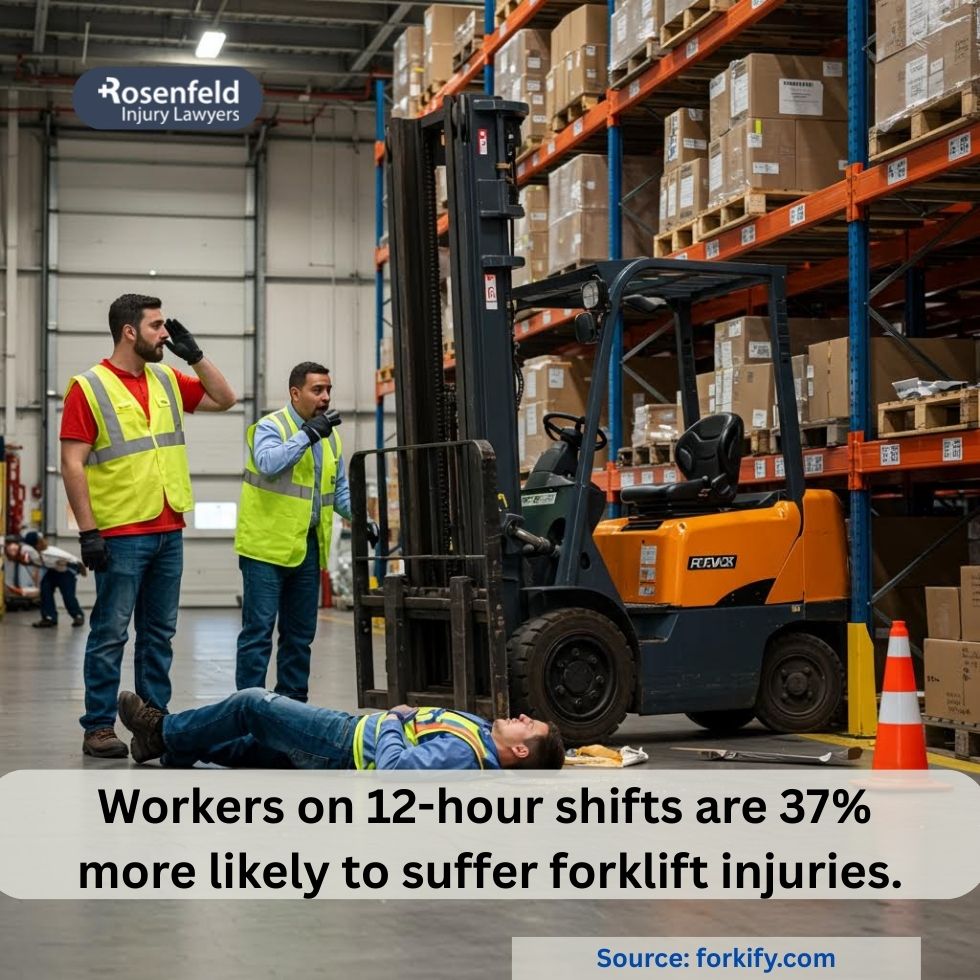
For a personal injury suit, you have two years from the date of the accident to file a claim (735 ILCS 5/13-202). A workers’ compensation claim can be brought up to three years after the accident, but you must have informed your employer of the accident within 45 days (820 ILCS 305/1).
Our Chicago forklift accident lawyers can hold a variety of parties liable for your injuries, including the following.
Workers’ compensation is a no-fault system, meaning that you only must prove that you were injured at work. However, third-party claims may be denied due to these common defenses. Our Chicago forklift accident lawyers will use meticulous evidence to demonstrate liability.
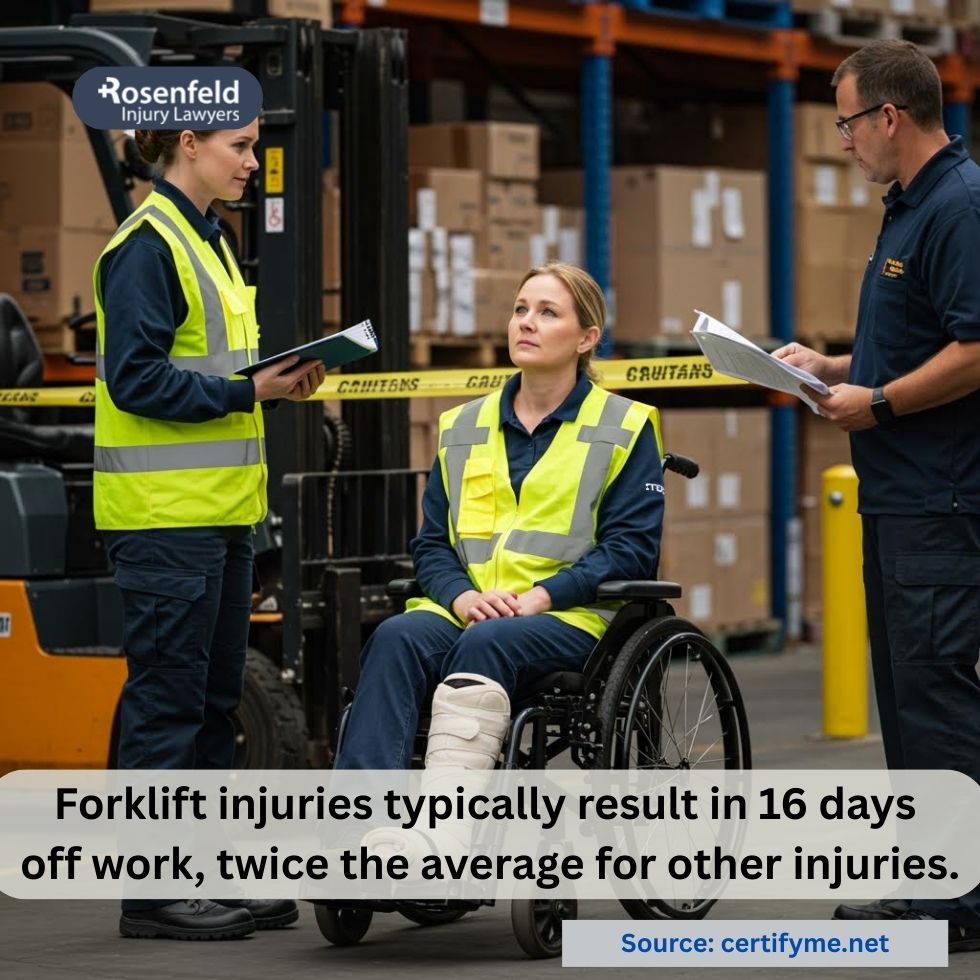
Our forklift accident lawyers will fight hard to ensure that you get the maximum settlement possible. We can assist with every aspect of your case, including:
With comprehensive and compassionate service, our top-rated attorneys will ensure you are treated fairly by third parties and the court system.
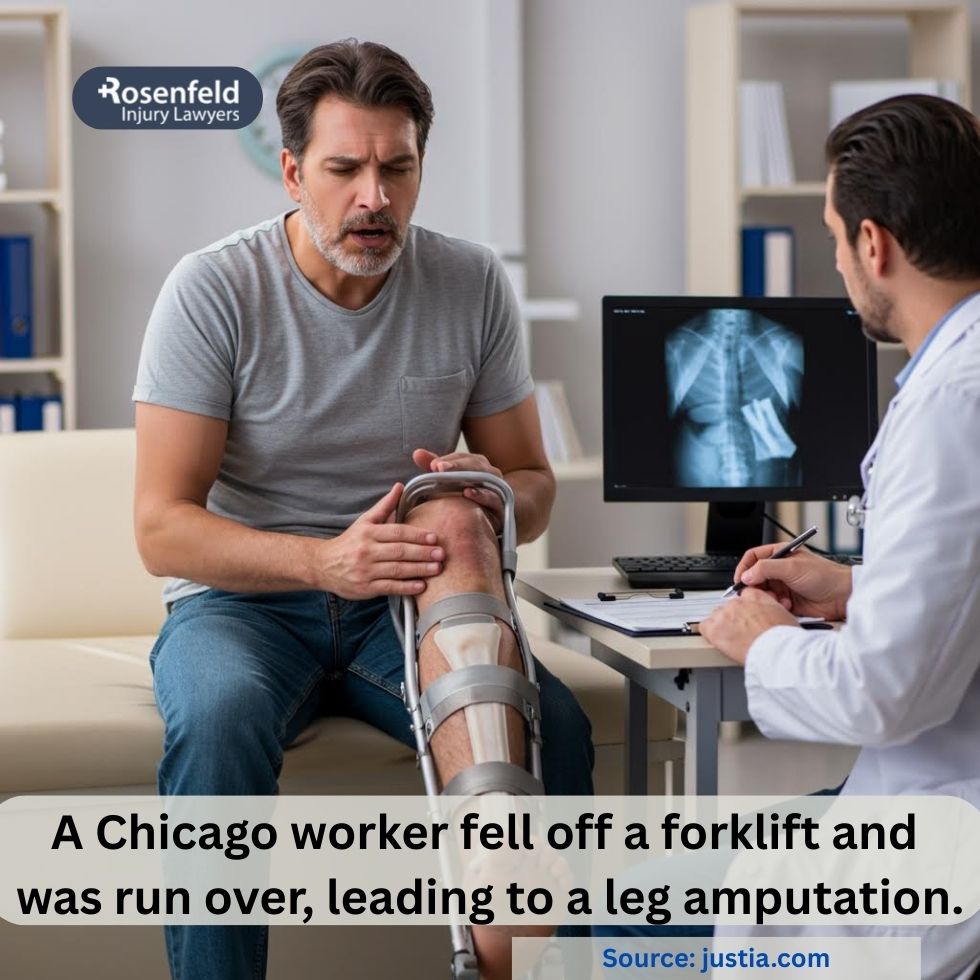
We provide legal assistance on a contingency fee basis, meaning that you owe us nothing unless we recover compensation.
Different forklift accident victims can file different claims. If you were an employee at a construction site or a distribution center, you can claim workers’ compensation benefits. Other parties, like contractors and third parties, can file a personal injury lawsuit.
How long it takes to settle depends on how willing the insurance company is to negotiate, the severity of your forklift injuries, and the strength of your evidence. It can take anywhere from a few months to several years.
The three-point contact rule is to prevent forklift accidents by maintaining three points of contact with the machine at all times.
As with other forms of transportation, like cars, pedestrians always have the right-of-way when operating a forklift.
This rule means that operators should never allow two forklifts to come within 20 feet of each other. This allows for adequate stopping distance and prevents forklift accidents.
A forklift tipping is most likely to result in fatal injuries.
The safety halo is a distance rule meant to prevent serious injuries or death. The warning zone is within three and six feet, which is when operators and pedestrians should make eye contact. Pedestrians always have the right of way.
The danger zone is when pedestrians are within three feet of the machine. Operators should never move the forklift when a person is so close.
Some companies have installed warning lights that can remind pedestrians of safe distances, in addition to ensuring all workers are properly trained to prevent accidents.
In general, the maximum safe speed is 10 miles per hour. In crowded areas, operators should limit their speed to between 3 miles per hour and 8 miles per hour.
Our Chicago work accident lawyers are top-rated attorneys with a 98% success rate and over $490 million recovered. We work on a contingency fee basis, ensuring everyone can afford high-quality legal support. Contact us to explore your legal options during a free consultation.
Content reviewed by Chicago work accident lawyer Jonathan Rosenfeld of Rosenfeld Injury Lawyers LLC, who holds employers, contractors, and third-party defendants accountable to recover compensation for injured workers, and is a trial lawyer recognized by the Illinois Trial Lawyers Association, the Illinois Workers Compensation Bar Association, and America’s Top 100 High Stakes Litigators.